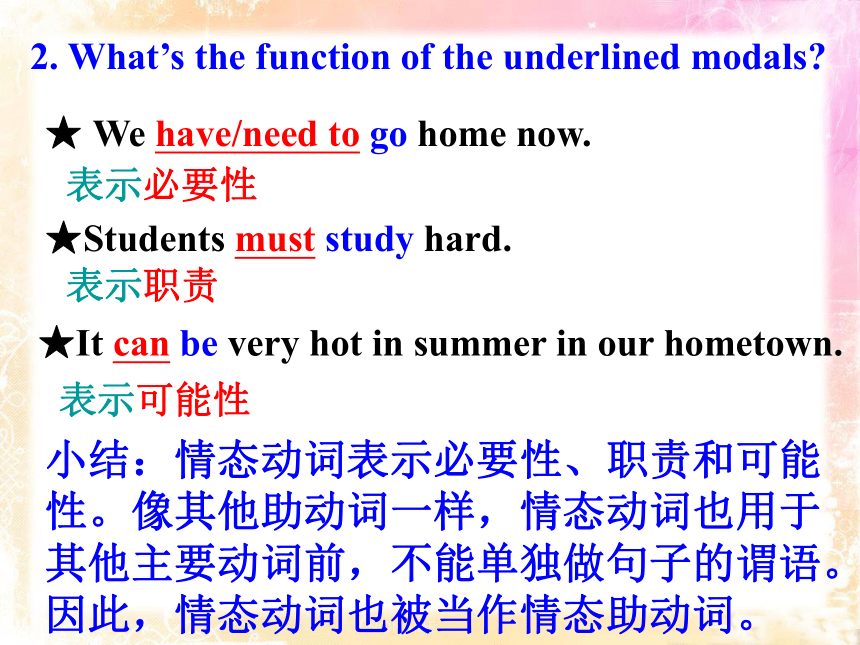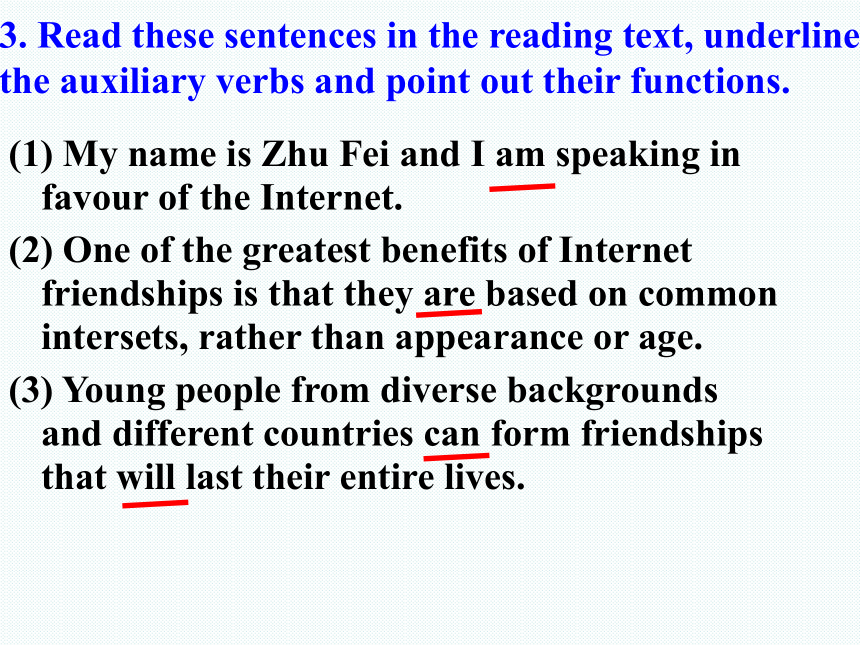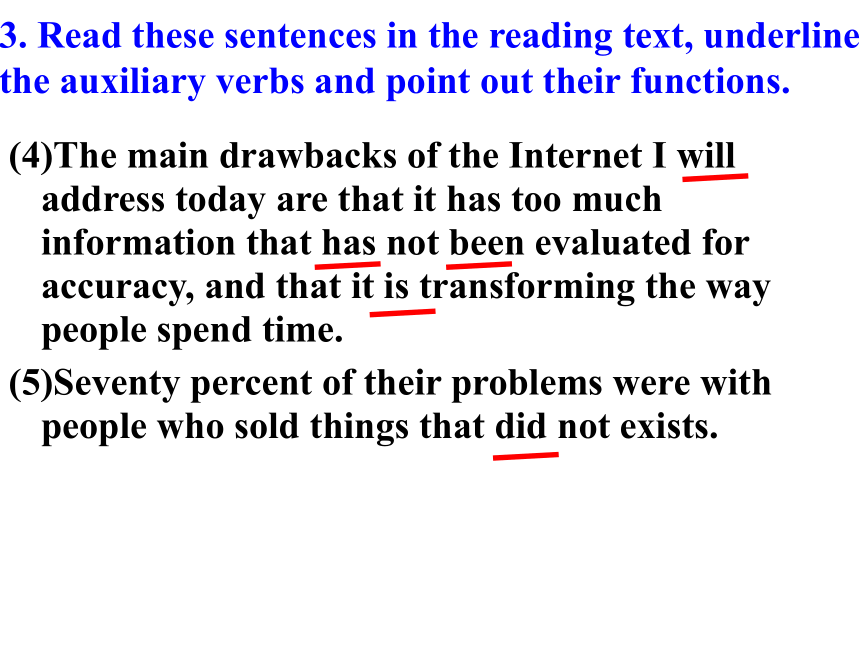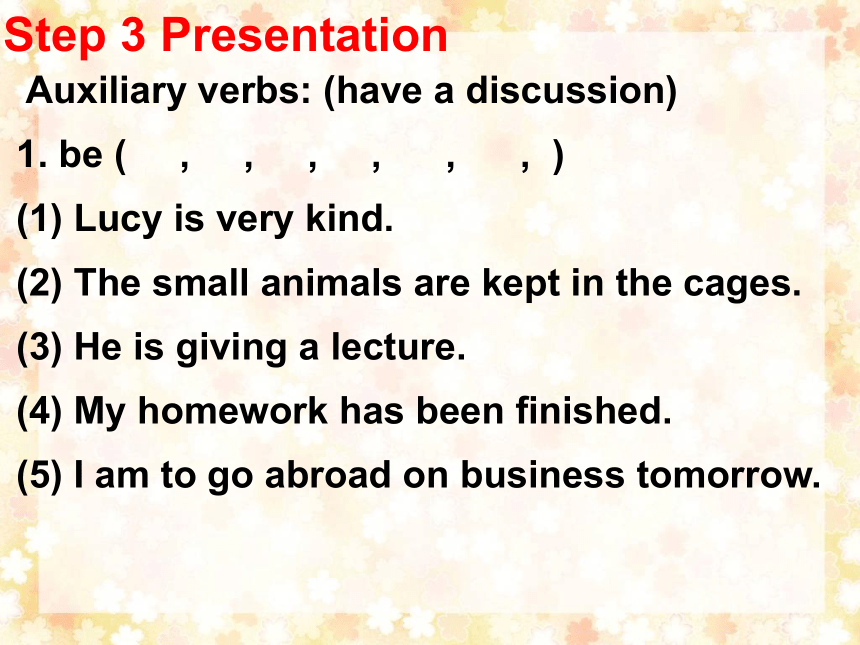Unit 3 The world online Grammar and usage(1)_ Auxiliary verbs 课件(28张)
文档属性
| 名称 | Unit 3 The world online Grammar and usage(1)_ Auxiliary verbs 课件(28张) |

|
|
| 格式 | zip | ||
| 文件大小 | 474.4KB | ||
| 资源类型 | 教案 | ||
| 版本资源 | 牛津译林版 | ||
| 科目 | 英语 | ||
| 更新时间 | 2019-07-31 00:00:00 | ||
图片预览









文档简介
课件28张PPT。Unit 3 The world online
Grammar Auxiliary verbs 协助主要动词构成谓语动词短语的词叫助动词。
被协助的动词称为主要动词。助动词本身没有词义,不可单独使用。What are auxiliary verbs?Step 1 Checking students' previewHe did not find any useful information on the Internet. ★We are having an English class.
★ I have seen the film.
★ He didn’t go home last night.
★ We will fly for Africa next month.
帮助主要动词have构成现在进行时帮助主要动词see构成现在完成时帮助主要动词go构成一般过去时帮助主要动词fly构成一般将来时1.What’s the fun_ction of the underlined words?Step 2 Introduction★ He was sent to England.
★I would fly to Sweden if I were a bird.
★Had I lived in London, I would have been to London Bridge.
1. What’s the fun_ction of the underlined words?帮助主要动词send构成被动语态帮助主要动词构成虚拟语气小结:助动词和其他动词一起构成时态、语气和语态。可以用作助动词的有be、do、have和情态动词。帮助主要动词构成虚拟语气★ We have/need to go home now.
★Students must study hard.
2. What’s the fun_ction of the underlined modals?表示必要性表示职责小结:情态动词表示必要性、职责和可能性。像其他助动词一样,情态动词也用于其他主要动词前,不能单独做句子的谓语。因此,情态动词也被当作情态助动词。★It can be very hot in summer in our hometown.表示可能性(1) My name is Zhu Fei and I am speaking in favour of the Internet.
(2) One of the greatest benefits of Internet friendships is that they are based on common intersets, rather than appearance or age.
(3) Young people from diverse backgrounds and different countries can form friendships that will last their entire lives.3. Read these sentences in the reading text, underline the auxiliary verbs and point out their functions.(4)The main drawbacks of the Internet I will address today are that it has too much information that has not been evaluated for accuracy, and that it is transforming the way people spend time.
(5)Seventy percent of their problems were with people who sold things that did not exists. 3. Read these sentences in the reading text, underline the auxiliary verbs and point out their functions. Auxiliary verbs: (have a discussion)
1. be ( , , , , , , )
(1) Lucy is very kind.
(2) The small animals are kept in the cages.
(3) He is giving a lecture.
(4) My homework has been finished.
(5) I am to go abroad on business tomorrow.
Step 3 Presentation 1. be ( , , , , , )
归纳总结: 1) be作为系动词表示主语性质、状态或客观存在等意思。
2)“be +不定式” 表示“ ”等未来的动作或状态。
3)“be +现在分词” 构成各种 时态。
4)“be +过去分词”构成 语态。
5)be用于have/has/had后构成 时态。Step 3 Presentationam is are was were been计划、安排;命令;义务进行被动完成 Auxiliary verbs: (have a discussion)
2. do ( , )
(1) Then, why does he come here?
(2) He didn't attend the meeting.
(3) You like pop music, don't you?
(4) You do know a lot about computers.
(5) Never did I see such a strange man. Step 3 Presentation2. do ( , )
归纳总结: 1) do作为助动词时的时态、人称和数的变化有 三种形式。
2)“do+主语+动词原形” 构成 句。
3) “do+not+动词原形” 构成 句。
4) “do(+not)+主语” 用于 句
5)“do +动词原形” 用于 。
6) “Never (Only) 等+do+主语+动词原形”用于 句。Step 3 Presentationdid doesdo , does , did疑问否定 反意疑问 强调(加强语气)倒装 Auxiliary verbs: (have a discussion)
3. have( , )
(1) I have never seen such a strange man.
(2) Can I have my hair cut now?
(3) He often has his assistant help him do it.Step 3 Presentation 3. have( , )
归纳总结:
1) “have+过去分词”构成 时态; “had+过去分词”构成 时态
2)“have+宾语+done表示 ;“have+宾语+do”表示 。Step 3 Presentationhas had现在完成过去完成使某事情被做让某人做某事Exercise 1: Fill in the blanks.
1. We _______ go to London tomorrow.
2. The modern Olympic Games _______held in 1896, in Athens.
3. What ______ you do if you had a billion?
4. The house belongs to my aunt, but she _____ (not live) here any more.
5. He ____(do) go to the cinema yesterday.willwerewoulddoesn't livedidExercise2:Translate the following sentences.
1.你打电话时,我正在洗澡。
2.孩子们被照顾得很好。
3.我学法语已经三年了
4.你去过长城吗?
I was having a bath when you called.The children are taken good care of.I have been studying French for three years.Have you been to the Great wall?
5.我不知道那本小说的名字。
6. 我确实认为你该去。
7.明年你要毕业了吗?
8.他告诉我们他将要出国学习了。
I don't know the name of that novel.I do think you should go.Will you graduate next year?He told us that he would study abroad.★I have to go to help her every Saturday. ★ You had better take an umbrella. 2.短语助动词:由一个助动词和另一个或两个词组成。如:have (got) to, had better, would sooner/rather(…than), be to, be likely to, be supposed to, ought to, used to, be about to ,be able to, etc.★ I have (got) to clean the blackboard before the teacher comes.
You didn't have to tell her the whole story.
have (got) to 表示“得做某事”,或提出建议,其否定形式not have to意为“不必”。 ★Many countries would rather be cautious with this new technology.
★I would sooner walk to work than take a bus.
would rather/sooner(…than)的意思是“宁愿,更愿意”。
★ He is to go to New York next week.
★The president is to speak on TV tonight.
★You are to explain this. We can’t stand this kind of behaviour.
be to表示未来的打算和安排,或用于正式的指示和命令。
说明:这种用法也可以说成是一种
将来时态表达法。★He is likely to win the first prize.
be likely to的意思是某事有可能发生★Teachers are supposed to treat all the students alike.
★ You are not supposed to smoke on the bus.
be supposed to用来表示“被期望”或“应该”。其否定形式be not supposed to用来表示“不允许”。
补充:was supposed to... 用于表示“某事本应该发生而没有发生”。
The train was supposed to arrive an hour ago.
2)be supposed to后面接“have + 过去分词”时,表示“本应该做某事而没做”。
You are supposed to have handed in your homework by now. ★I used to love cats until I was attacked by a big black cat last week.
★He didn’t use to smoke when he was young.
★Did he use to come as often as he does now?
used to表示“过去一直”或“过去经常”。
1. Jack’s ill,so they ______ change their plans.
A. must B. should
C. have got to D. ought to
2. If it is fine tomorrow, we ______ a football match.
A. have B. will have C. has D. shall has Step 4 Consolidation 3. In the past 30 years China ______ great advances in the socialist revolution and socialist construction. A. has made B. have made
C. had made D. having made 4. I ______ go to bed until I ______ finished my work. A. don’t/had B. didn’t/have
C. didn’t/had D. don’t/have 5. People are _____ to _____ when they meet for the first time.
suppose; shake hands
supposed; shake hands
C. supposed; shake hands
D. suppose; shake hand
6.When he was at school, he ______ early and take a walk before breakfast. A. will rise B. shall rise
C. should rise D. would rise
7.You ______ your seats today if you want to go to the game. A. had better to reserve B. had better reserve C. had to better reserve D. had to reserve better
8.___ I realized the consequences I would never have contemplated getting involved. A. Had B. Have C. Having D. Has
9. I _____the operation unless it is absolutely necessary. A. would rather not have
B. would not rather had C. rather would not have
D. rather not would have 1. Review what we have learned in class.
2. Go over the exercises in class.
3. Finish the workbook exercises (P120).Step 5 Homework
被协助的动词称为主要动词。助动词本身没有词义,不可单独使用。What are auxiliary verbs?Step 1 Checking students' previewHe did not find any useful information on the Internet. ★We are having an English class.
★ I have seen the film.
★ He didn’t go home last night.
★ We will fly for Africa next month.
帮助主要动词have构成现在进行时帮助主要动词see构成现在完成时帮助主要动词go构成一般过去时帮助主要动词fly构成一般将来时1.What’s the fun_ction of the underlined words?Step 2 Introduction★ He was sent to England.
★I would fly to Sweden if I were a bird.
★Had I lived in London, I would have been to London Bridge.
1. What’s the fun_ction of the underlined words?帮助主要动词send构成被动语态帮助主要动词构成虚拟语气小结:助动词和其他动词一起构成时态、语气和语态。可以用作助动词的有be、do、have和情态动词。帮助主要动词构成虚拟语气★ We have/need to go home now.
★Students must study hard.
2. What’s the fun_ction of the underlined modals?表示必要性表示职责小结:情态动词表示必要性、职责和可能性。像其他助动词一样,情态动词也用于其他主要动词前,不能单独做句子的谓语。因此,情态动词也被当作情态助动词。★It can be very hot in summer in our hometown.表示可能性(1) My name is Zhu Fei and I am speaking in favour of the Internet.
(2) One of the greatest benefits of Internet friendships is that they are based on common intersets, rather than appearance or age.
(3) Young people from diverse backgrounds and different countries can form friendships that will last their entire lives.3. Read these sentences in the reading text, underline the auxiliary verbs and point out their functions.(4)The main drawbacks of the Internet I will address today are that it has too much information that has not been evaluated for accuracy, and that it is transforming the way people spend time.
(5)Seventy percent of their problems were with people who sold things that did not exists. 3. Read these sentences in the reading text, underline the auxiliary verbs and point out their functions. Auxiliary verbs: (have a discussion)
1. be ( , , , , , , )
(1) Lucy is very kind.
(2) The small animals are kept in the cages.
(3) He is giving a lecture.
(4) My homework has been finished.
(5) I am to go abroad on business tomorrow.
Step 3 Presentation 1. be ( , , , , , )
归纳总结: 1) be作为系动词表示主语性质、状态或客观存在等意思。
2)“be +不定式” 表示“ ”等未来的动作或状态。
3)“be +现在分词” 构成各种 时态。
4)“be +过去分词”构成 语态。
5)be用于have/has/had后构成 时态。Step 3 Presentationam is are was were been计划、安排;命令;义务进行被动完成 Auxiliary verbs: (have a discussion)
2. do ( , )
(1) Then, why does he come here?
(2) He didn't attend the meeting.
(3) You like pop music, don't you?
(4) You do know a lot about computers.
(5) Never did I see such a strange man. Step 3 Presentation2. do ( , )
归纳总结: 1) do作为助动词时的时态、人称和数的变化有 三种形式。
2)“do+主语+动词原形” 构成 句。
3) “do+not+动词原形” 构成 句。
4) “do(+not)+主语” 用于 句
5)“do +动词原形” 用于 。
6) “Never (Only) 等+do+主语+动词原形”用于 句。Step 3 Presentationdid doesdo , does , did疑问否定 反意疑问 强调(加强语气)倒装 Auxiliary verbs: (have a discussion)
3. have( , )
(1) I have never seen such a strange man.
(2) Can I have my hair cut now?
(3) He often has his assistant help him do it.Step 3 Presentation 3. have( , )
归纳总结:
1) “have+过去分词”构成 时态; “had+过去分词”构成 时态
2)“have+宾语+done表示 ;“have+宾语+do”表示 。Step 3 Presentationhas had现在完成过去完成使某事情被做让某人做某事Exercise 1: Fill in the blanks.
1. We _______ go to London tomorrow.
2. The modern Olympic Games _______held in 1896, in Athens.
3. What ______ you do if you had a billion?
4. The house belongs to my aunt, but she _____ (not live) here any more.
5. He ____(do) go to the cinema yesterday.willwerewoulddoesn't livedidExercise2:Translate the following sentences.
1.你打电话时,我正在洗澡。
2.孩子们被照顾得很好。
3.我学法语已经三年了
4.你去过长城吗?
I was having a bath when you called.The children are taken good care of.I have been studying French for three years.Have you been to the Great wall?
5.我不知道那本小说的名字。
6. 我确实认为你该去。
7.明年你要毕业了吗?
8.他告诉我们他将要出国学习了。
I don't know the name of that novel.I do think you should go.Will you graduate next year?He told us that he would study abroad.★I have to go to help her every Saturday. ★ You had better take an umbrella. 2.短语助动词:由一个助动词和另一个或两个词组成。如:have (got) to, had better, would sooner/rather(…than), be to, be likely to, be supposed to, ought to, used to, be about to ,be able to, etc.★ I have (got) to clean the blackboard before the teacher comes.
You didn't have to tell her the whole story.
have (got) to 表示“得做某事”,或提出建议,其否定形式not have to意为“不必”。 ★Many countries would rather be cautious with this new technology.
★I would sooner walk to work than take a bus.
would rather/sooner(…than)的意思是“宁愿,更愿意”。
★ He is to go to New York next week.
★The president is to speak on TV tonight.
★You are to explain this. We can’t stand this kind of behaviour.
be to表示未来的打算和安排,或用于正式的指示和命令。
说明:这种用法也可以说成是一种
将来时态表达法。★He is likely to win the first prize.
be likely to的意思是某事有可能发生★Teachers are supposed to treat all the students alike.
★ You are not supposed to smoke on the bus.
be supposed to用来表示“被期望”或“应该”。其否定形式be not supposed to用来表示“不允许”。
补充:was supposed to... 用于表示“某事本应该发生而没有发生”。
The train was supposed to arrive an hour ago.
2)be supposed to后面接“have + 过去分词”时,表示“本应该做某事而没做”。
You are supposed to have handed in your homework by now. ★I used to love cats until I was attacked by a big black cat last week.
★He didn’t use to smoke when he was young.
★Did he use to come as often as he does now?
used to表示“过去一直”或“过去经常”。
1. Jack’s ill,so they ______ change their plans.
A. must B. should
C. have got to D. ought to
2. If it is fine tomorrow, we ______ a football match.
A. have B. will have C. has D. shall has Step 4 Consolidation 3. In the past 30 years China ______ great advances in the socialist revolution and socialist construction. A. has made B. have made
C. had made D. having made 4. I ______ go to bed until I ______ finished my work. A. don’t/had B. didn’t/have
C. didn’t/had D. don’t/have 5. People are _____ to _____ when they meet for the first time.
suppose; shake hands
supposed; shake hands
C. supposed; shake hands
D. suppose; shake hand
6.When he was at school, he ______ early and take a walk before breakfast. A. will rise B. shall rise
C. should rise D. would rise
7.You ______ your seats today if you want to go to the game. A. had better to reserve B. had better reserve C. had to better reserve D. had to reserve better
8.___ I realized the consequences I would never have contemplated getting involved. A. Had B. Have C. Having D. Has
9. I _____the operation unless it is absolutely necessary. A. would rather not have
B. would not rather had C. rather would not have
D. rather not would have 1. Review what we have learned in class.
2. Go over the exercises in class.
3. Finish the workbook exercises (P120).Step 5 Homework
